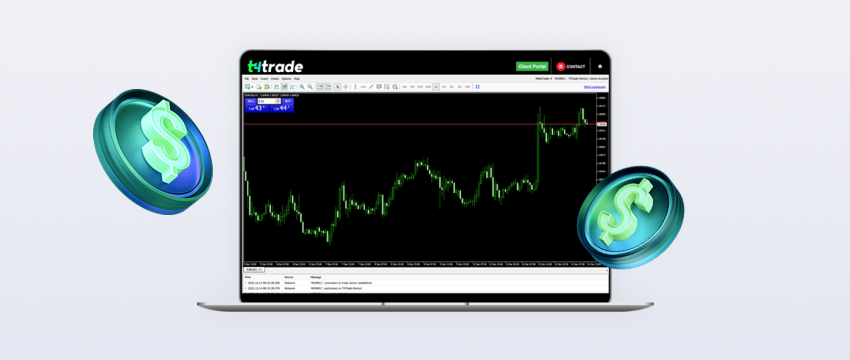There are various approaches to forex trading with a variety of styles to suit different temperaments, levels of expertise, and budget. In this blog, we’ll focus on fundamental traders.
Fundamental traders typically make trading decisions based on the difference between an asset’s intrinsic value and its market price. In other words, they seek to establish to what extent the value of an asset differs from its current market price.
In the course of executing trades, traders will conduct a form of fundamental analysis of a company or the economy. They do this to determine the value inherent in a stock, commodity, currency pair, etc.
This analysis will include the study of financial statements, economic indicators, and industry sentiment. The point of this analysis is also to determine whether an asset is overvalued, undervalued, or fairly priced.
Carrying out fundamental analysis from traders
Fundamental analysis involves several steps. Each one plays a critical role in ascertaining the value of an asset and for making the decision to execute a trade.

Step 1: Conducting research as a fundamental trader
Once you’ve identified your preferred financial instrument, it’s time to perform thorough research on it. In the case of stocks, you’d need to research the company, including its management team, financial statements, competitive position, and industry trends.
For currency pairs, research may involve assessing a country’s political and economic stability, central bank policies, interest rates, inflation rates, etc.
Step 2: Studying financial statements
For those traders looking to engage in stock trading, studying the company’s financial statements is vital.
This includes the auditor’s report, the income statement, the balance sheet, the cash flow statement to understand profitability, financial stability, and cash flow. In particular, traders must consider the following data:
- Earnings per share
- Price-to-book ratio
- Dividend yield
- Free cash flow
- Return on equity
- Price to earnings
- Debt-to-equity ratio
- Rate of turnover
- Market capitalisation

Step 3: Predicting trends for fundamental traders
Understanding economic indicators is another crucial component of fundamental analysis. This is because they typically provide insights into an economy’s overall health or at least the direction in which that economy is heading. They also tend to drive commodity or forex prices.
Important economic indicators are:
- Gross Domestic Product (GDP): measures the monetary value of goods and services produced in a country in a given period of time.
- Consumer Spending: assists businesses in anticipating demand for their products or services.
- Interest Rates: influence borrowing costs, consumer spending, and overall economic activity.
- Unemployment Rate: reflects labour market conditions. Low unemployment rates typically indicate economic strength and increased potential for consumer spending. Higher unemployment rates suggest the opposite.
- Housing Market: offers insights into consumer confidence and spending. Stats like house sales and prices have an impact on the construction and real estate sectors.
- Consumer Price Index (CPI): measures price increases over time.
- Business Confidence Index: measures business owners’ optimism about future economic conditions.
- Trade Balance: measures the difference between exports and imports which impact exchange rates and companies engaged in global trade.
Step 4: Compare the intrinsic value of an asset to the market price
After having completed steps 1 to 3, you now need to establish the asset’s intrinsic value. Once you have an estimate, compare it to the current market price. If the market price falls below the intrinsic value, the asset might be undervalued, whereas if it’s above, the asset may be considered overvalued. Both present the opportunity for buying or selling.
Step 5: Staying informed about current affairs
Fundamental traders must ensure they follow the news to stay informed of any market moving events in real time. This includes central bank announcements, geopolitical developments, industry-specific trends, etc.
Step 6: Develop a Trading Plan for Traders
As you launch into executing trades, ensure you have a proper risk management plan in place that specifies your objectives, your budget, and the rules by which you’ll trade. Incorporate risk management measures into your forex trading plan as well to safeguard your funds.
At the same time, consider journalling your trades so that you have a historical record of how you came to certain trading decisions. This allows you to assess your rationale when executing trades and adjusting where required.
The upside to fundamental analysis
Fundamental analysis offers some unique positives to a trader. For one, the level of analysis conducted increases the likelihood that you’ll be making informed trading decisions.
Second, by focusing on an asset’s intrinsic value and the underlying factors that drive its price, means you’ll less likely be influenced by short-term market volatilities, and instead focus on the larger, longer-term, picture.
Third, considering the volume of data you’ll be analysing, you’re more likely to identify mispriced assets, and uncover trading opportunities that others may overlook.
Disadvantages of fundamental analysis
Fundamental analysis is oftentimes considered overly complex and time consuming. Further, if one considers the amount of research and analysis required, it can also be overwhelming, especially if you’re new to trading.
Also, seeing as fundamental trading is a longer term approach, earning gains is often delayed. Therefore, a fundamental trader requires patience and the ability to hold onto positions even when the market is moving in a seemingly adverse direction.
Additionally, fundamental traders should have a robust understanding of accounting principles, economics, and finance.
Fundamental Traders: Analysis and Psychology
Regardless of your trading approach, be this as a fundamental trader or any other, your trading psychology will play an important role in how you make decisions.
The concept of feelings impacting how we trade, and why, is becoming increasingly popular in this industry. This is because emotions – like guilt, fear, arrogance, anxiety, panic or stress – all have the ability to make us do things that when reflected on later, make very little rational sense.
In the context of trading, this can lead to very poor financial outcomes or complete loss of funds, quickly and seemingly completely out of leftfield. So, regulating those emotions is incredibly important to achieve longevity in the forex trading game.
How traders choose to maintain a robust trading psychology differs from person to person but may include any one of or a combination of the following activities:
- Taking a break from their computer for several minutes to a few hours to clear their heads.
- Engaging in mindfulness practices or meditation to calm the mind.
- Undertaking some form of physical exercise and eating healthy to keep the body and mind strong.

Engaging in Learning for Fundamental Traders
Regardless of how experienced you are as a trader, making time to learn more about trading is key to ensure you remain skilled, and that your information is up to date.
Learning should be an ongoing endeavour so that you can keep up with market developments and technological advancements.
There are many ways to acquire a trading related education, be this via blogs, ebooks, podcasts, seminars, webinars, etc. You could consider even signing up for a demo trading account to gain more practical experience or to test out complex fundamental trading strategies.
Trading with T4Trade
T4Trade is a popular global broker with clients worldwide. The broker offers top-tier, 24/5 multilingual customer support, cutting-edge trading platforms, and flexible forex trading conditions. T4Trade is also a great go-to resource for traders looking to learn more about forex trading in a user-friendly way.
A variety of videos, podcasts, eBooks, webinars, and videos-on-demand are curated by in-house specialists, catering to all types of traders.
T4Trade traders can also choose from a wide range of trading instruments across 6 asset classes, and enjoy flexible leverage, competitive spreads, fast trade execution and seamless deposit and withdrawal options. Traders can also choose from multiple trading accounts that best suit their needs and individual preferences.
Disclaimer: This material is for general informational and educational purposes only and should not be considered investment advice or an investment recommendation. T4Trade is not responsible for any data provided by third parties referenced or hyperlinked in this communication.




